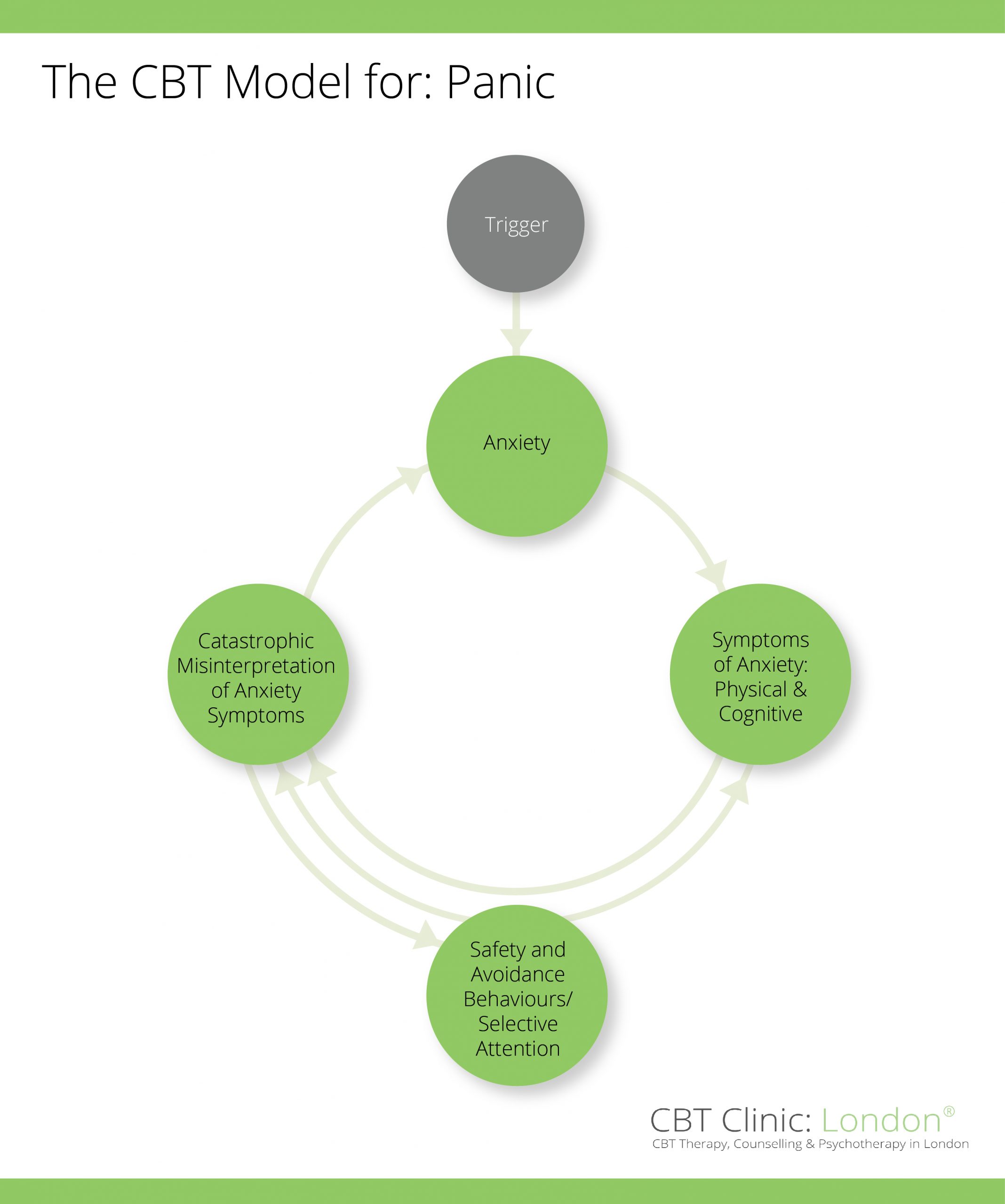CBT Therapy for Panic Attacks (Panic Disorder)
Highly Effective Treatment For Panic Attacks (Panic Disorder).
Panic Disorder:
The main symptoms of panic disorder are attacks of intense fear and discomfort that happen unexpectedly and repeatedly. There may also be physical symptoms such as chest pain, sickness, dizziness, a racing heart beat, breathlessness, sweating or shaking. People with panic disorder may avoid situations that they think might lead to a panic attack. They may also fear or avoid public spaces (this is known as agoraphobia).
A person experiencing a panic attack may go to a hospital accident and emergency department mistakenly thinking they are having a heart attack because their heart rate is so high. If this happens to you, after the healthcare professionals have ruled out any physical cause of your symptoms, they should ask you about any previous treatment, give you information about panic disorder and advise you to see your GP. In most cases, you should not be admitted to hospital if you have had a panic attack.
Source: NICE 2023
Patient Quote
“About six months ago I suddenly had a panic attack when I was travelling on the London Underground and then after that I was so fearful every time I had to get on a train. It got so bad that I wouldn’t feel safe unless my husband was with me. My CBT Therapist helped me manage my panic and now I can travel on public transport again with complete freedom.”
Juliane, IT Sales
Panic Attacks:
The core symptom of panic disorder is recurrent panic attacks, an overwhelming combination of physical and psychological distress. During an attack several of these symptoms occur in combination:
- Palpitations, pounding heart or rapid heart rate
- Sweating
- Trembling or shaking
- Feeling of shortness of breath or smothering sensations
- Chest pain
- Feeling dizzy, light-headed or faint
- Feeling of choking
- Numbness or tingling
- Chills or hot flashes
- Nausea or abdominal pains
- Feeling detached
- Fear of losing control
- Fear of dying
Because symptoms are so severe, many people who experience a panic attack may believe they are having a heart attack or other life-threatening illness and may go to a hospital ER. Panic attacks may be expected, such as a response to a feared object, or unexpected, apparently occurring for no reason. The mean age for onset of panic disorder is 22-23. Panic attacks may occur with other mental disorders such as depression or PTSD.
Our information about anxiety, panic and phobias is being updated.
We will publish the updated version on this page as soon as it is ready.
We apologise for any inconvenience caused.
Psychological treatment
If you decide to have psychological treatment, you should be offered Cognitive Behavioural Therapy (which is sometimes shortened to CBT therapy). CBT Therapy helps you to understand how your problems, thoughts, feelings and behaviour affect each other.
You should receive between 7 and 14 hours of treatment in total. This is usually provided as weekly sessions of 1–2 hours each, and the total treatment should be completed within 4 months.
During your CBT Therapy you should see your GP or other primary care health professional regularly to assess how you are doing.
Source: NICE 2023
Changing Catastrophic Interpretation
Behavioural Experiments
Reducing Safety Behaviours
CBT Therapy Model Panic Disorder

- The essential feature is recurrent attacks of severe anxiety (panic), which are not restricted to any particular situation or set of circumstances and are therefore unpredictable. As with other anxiety disorders, the dominant symptoms include sudden onset of palpitations, chest pain, choking sensations, dizziness, and feelings of unreality (depersonalization or derealization). There is often also a secondary fear of dying, losing control, or going mad. Panic disorder should not be given as the main diagnosis if the patient has a depressive disorder at the time the attacks start; in these circumstances the panic attacks are probably secondary to depression.
-
Panic:
- attack
- state
- Excl.:
- panic disorder with agoraphobia (F40.0)
Book a Free Consultation with a CBT Therapist in London
We have facilitated the successful recovery of many people who suffer from Panic Attacks (Panic Disorder).
If you would like CBT Therapy for Panic Attacks (Panic Disorder) then get in touch with us using the form below and
we will arrange a no obligation Zoom call with one of our expert CBT Therapists.
CBT Therapist London
This information was curated by Alistair Bond – Senior CBT Therapist in London. He is the Clinical Director of the CBT Clinic London and he provides CBT Therapy for Panic Attacks (Panic Disorder) and has facilitated numerous successful recoveries.
If you or a loved one are struggling with Panic Attacks (Panic Disorder) then please get in touch with us. You can call our friendly reception team on 0207 157 9924, email info@cbtcliniclondon.com or simply fill out our new patient registration form and we’ll get back to you.

Online CBT Therapy or Face to Face CBT Therapy? The Choice is Yours.
Do you need the CBT Therapy Online or the CBT Therapy Face to Face in one of our London Clinics? At the CBT Clinic London we offer both remote and face to face sessions. We also offer the option to combine delivery methods to suit your lifestyle and preference.

